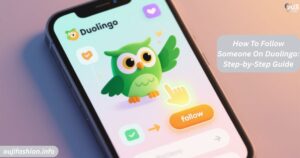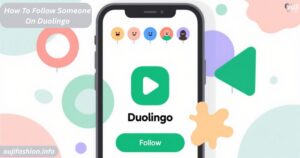Is Duolingo dangerous? Many people wonder about the risks of using learning apps. Is Duolingo safe? It’s a fair question, especially with online privacy concerns growing. Some users ask, is Duolingo actually dangerous or is Duolingo safe to use every day. The app is popular, but it collects user data and shows ads. That makes some people worry. Still,Is Duolingo dangerous millions use it daily without problems.
Others joke, is the Duolingo bird dangerous? Of course not! But behind the fun design, there are serious questions. Is Duolingo dangerous for your privacy? Can kids use it safely? What about your personal info? These are smart things to ask before downloading any app. Understanding the risks helps you stay safe. In this guide, we’ll break it all down so you can decide for yourself:is Duolingo dangerous, or just misunderstood?
What is Duolingo?
Duolingo is a free language learning app that helps people learn new languages through fun, gamified lessons. With its cheerful owl mascot, Duo,Is Duolingo dangerous the platform offers interactive online language courses covering grammar, vocabulary building, speaking practice, and listening comprehension.
The Duolingo Learning Experience
Duolingo is widely used for learning new languages, but some people wonder if it’s really safe. Like most apps,Is Duolingo dangerous it comes with both benefits and risks. While it’s fun, free, and educational, users should still be aware of how their data is handled and what the app collects behind the scenes.
Here are some key things to keep in mind:
- Duolingo collects user data, including email addresses and device info
- It uses an ad-supported model, which may include third-party tracking
- Public profiles can be viewed unless privacy settings are adjusted
- A past data scraping incident highlighted potential security gaps
- App permissions may give access to more device information than you expect
- Duolingo uses encryption and two-factor authentication for added safety
So, while Duolingo isn’t dangerous, it’s smart to use it with care. A few quick privacy checks can go a long way in keeping your experience safe
Duolingo’s Popularity and User Base
Duolingo has become one of the most popular language learning apps in the world, with millions of users logging in daily to learn everything from Spanish to Japanese. Its fun, gamified lessons and friendly mascot, Duo, make it appealing to learners of all ages. Whether you’re a student, traveler, or just curious about new languages, Duolingo’s simple design and free access have helped it build a massive global user base.
Read more: https://oujifashion.info/how-to-add-duolingo-widget-a-complete-guide/
How Duolingo Works
Duolingo is a free language learning app that helps people learn new languages through fun, gamified lessons. With its cheerful owl mascot,Is Duolingo dangerous Duo, the platform offers interactive online language courses covering grammar, vocabulary building, speaking practice, and listening comprehension.
Gamification in Language Learning
Gamification makes learning feel less like schoolwork and more like a game, which is why apps like Duolingo are so addictive. With streaks, XP points, levels, and cute rewards, users stay motivated to keep going:even if it’s just five minutes a day. This playful approach keeps learners engaged and makes language practice part of their daily routine without feeling like a chore.
Lesson Structure and Progress Tracking
Duolingo’s lessons are short, focused, and designed to build skills step by step. Each unit covers a specific topic like vocabulary, grammar, or listening, and you can clearly see how far you’ve come with its progress tracker. As you complete lessons, the app unlocks new levels and adjusts to your learning behavior,Is Duolingo dangerous helping you move forward at a pace that fits your needs.
Potential Dangers of Using Duolingo

While Duolingo is a helpful educational technology tool, it does collect user data like IP addresses, device information,Is Duolingo dangerous and usage patterns. If privacy settings aren’t managed properly, there’s a risk of data being shared for third-party advertising or being exposed in a data scraping incident.
Data Collection Practices
- Duolingo uses gamified learning to keep you motivated
- Lessons are short, fun, and easy to follow
- You earn points, badges, and streaks for daily practice
- The app tracks your learning progress as you go
- It adjusts difficulty based on your performance
- Privacy settings let you control what info is shared
With the right settings and a bit of consistency, Duolingo can be both fun and safe. Just use it smartly, and you’ll get the most out of it.
Privacy Concerns
Using Duolingo means sharing some personal information, like your email, username, and learning habits. The app also tracks usage patterns and may share data with third-party advertisers. While Duolingo offers privacy settings and data encryption, Is Duolingo dangerous many users aren’t aware of how much info is collected behind the scenes. That’s why it’s important to review app permissions and adjust your settings for better control over your data.
Addictive Design and Screen Time
Duolingo’s gamified learning system:streaks, rewards, and badges:is designed to keep you coming back. While this makes learning fun, it can also lead to excessive screen time, especially for kids. The pressure to keep a daily streak going may shift focus from quality learning to simply “not breaking the chain.” Setting screen time limits can help keep the experience healthy and balanced.
Duolingo’s Security Measures
While Duolingo is a helpful educational technology tool, it does collect user data like IP addresses,Is Duolingo dangerous device information, and usage patterns. If privacy settings aren’t managed properly, there’s a risk of data being shared for third-party advertising or being exposed in a data scraping incident.
Data Protection Protocols
User Account Safety
Duolingo and Personal Information
While Duolingo is a helpful educational technology tool, it does collect user data like IP addresses,Is Duolingo dangerous device information, and usage patterns. If privacy settings aren’t managed properly, there’s a risk of data being shared for third-party advertising or being exposed in a data scraping incident.
What Data Does Duolingo Collect?
Duolingo collects a variety of data to help personalize your learning experience. This includes your email address, username,Is Duolingo dangerous IP address, device information, and how you interact with the app:like your learning behavior, progress, and usage patterns. If you create a public profile, some of this information may also be visible to others unless you adjust your privacy settings
How Duolingo Uses Your Data
Duolingo uses your data to improve your language learning journey by tailoring lessons to your skill level and progress. It also helps the app recommend content and show relevant ads, since it runs on an ad-supported model. In some cases,Is Duolingo dangerous your data may be shared with third-party advertisers, but the company says it follows privacy laws like GDPR and CCPA to keep your information protected.
Past Security Incidents Involving Duolingo
While Duolingo is a helpful educational technology tool, it does collect user data like IP addresses, Is Duolingo dangerous device information, and usage patterns. If privacy settings aren’t managed properly, there’s a risk of data being shared for third-party advertising or being exposed in a data scraping incident.
The 2023 Data Scraping Incident
In 2023, Duolingo faced a data scraping incident where automated bots pulled information from public user profiles using an exposed API. Although no passwords or private messages were leaked, usernames, email addresses,Is Duolingo dangerous and other visible data were collected and shared online. This raised concerns about how well user data was being protected and whether enough security measures were in place for mobile app users.
- Public profiles were accessed in bulk through the API
- Email addresses were linked to usernames
- Learning behavior and usage patterns were exposed
- The incident appeared on hacking forums
- No financial data or passwords were leaked
- Duolingo confirmed the issue and launched an internal review
This event highlighted the importance of strong cybersecurity even for educational apps. It reminded users and companies alike that even public data needs protection.
Lessons Learned and Improvements Made
After the incident, Duolingo took several steps to close security gaps and protect user information going forward. The company reviewed its system architecture,Is Duolingo dangerous limited access to user data, and improved transparency about what information is shared. These changes aimed to rebuild trust with privacy-conscious users and reduce the risk of similar issues in the future.
- API endpoints were secured and tightened
- Monitoring tools were upgraded to detect scraping
- App permissions were reviewed and adjusted
- User privacy settings were expanded and clarified
- Public profile data was made less accessible
- Users were encouraged to use strong passwords and 2FA
Thanks to these updates, Duolingo is now a safer space for learners. The incident became a valuable lesson in digital safety and proactive protection.
Comparing Duolingo’s Safety to Other Language
While Duolingo is a helpful educational technology tool, it does collect user data like IP addresses, device information,Is Duolingo dangerous and usage patterns. If privacy settings aren’t managed properly, there’s a risk of data being shared for third-party advertising or being exposed in a data scraping incident.
Learning Apps
Learning apps have changed the way we pick up new skills:especially languages. From vocabulary building to grammar practice, they bring the classroom to your phone. Whether you’re into private tutoring, community classes, or self-study, these digital tools make learning more flexible and fun.
Industry Standards for Data Protection
When it comes to protecting user data, companies like Duolingo are expected to follow strict industry standards. These guidelines help ensure that personal information stays safe from hackers, misuse,Is Duolingo dangerous and unauthorized access. Whether it’s a language learning app or a major tech platform, sticking to these standards builds trust and keeps users in control of their digital privacy.
Key data protection standards include:
- Encryption at rest and in transit to keep data secure during storage and transfer
- Two-factor authentication for stronger login protection
- Regular security audits to catch and fix potential vulnerabilities
- GDPR and CCPA compliance to meet global privacy laws
- User-friendly privacy settings that give users control over their data
- Clear data collection policies that explain what’s gathered and why
Duolingo vs. Competitors in Terms of Security
When it comes to security, Duolingo holds its own among language learning apps, but it’s not perfect. It uses encryption, offers two-factor authentication, and follows basic data protection practices. However, its free,Is Duolingo dangerous ad-supported model means more user data may be shared with third-party advertisers compared to paid apps like Rosetta Stone or Babbel.
Apps like Babbel and Rosetta Stone tend to focus more on privacy since they rely on subscriptions instead of ads. That often means less tracking and fewer targeted ads. While Duolingo is a great free option, privacy-conscious users might prefer alternatives with tighter control over personal information.
Tips for Safe Duolingo Usage

Use strong passwords,Is Duolingo dangerous turn on two-factor authentication, and limit app permissions to protect your account. Avoid sharing personal info on public profiles and monitor your learning behavior for unusual activity. These small steps can greatly reduce cybersecurity risks.
Keeping Your Information Safe
- Create a strong password that’s different from others you use
- Turn on extra security like login verification
- Avoid putting personal info like your full name or email in your public profile
- Check your privacy options often to make sure you’re comfortable with them
Controlling App Permissions
Like many apps, Duolingo may ask for access to things like your microphone or notifications. Here’s how you can adjust those settings:
- On Android: Go to Settings > Apps > Duolingo > Permissions
- On iPhone: Open Settings > Duolingo > Switch permissions on or off
Stick to giving the app only what it truly needs to work properly:nothing more.
Duolingo for Kids: Special Considerations
Duolingo for Schools and its parental controls make it a safer option for younger learners. Parents can manage screen time,Is Duolingo dangerous track learning progress, and ensure kids focus on vocabulary and grammar practice without distractions from targeted ads or unsafe content.
Child Safety Features
Duolingo includes features that help make language learning safer for kids. These tools are designed to protect young users from unwanted content, limit distractions, and create a positive learning space.
- A kid-friendly interface with no harmful content
- Limited social interaction to reduce risks
- No requirement to share personal details
- Progress tracking for parents and teachers
- Ad filters for age-appropriate content
- Options to disable leaderboard and discussion forums
Parental Controls and Supervision
Parents can take extra steps to guide their child’s experience on Duolingo. Using built-in tools and device settings, they can manage usage, privacy, and safety more effectively.
- Set daily time limits for screen time balance
- Monitor learning progress through linked accounts
- Disable in-app purchases and pop-up ads
- Restrict access to microphone or camera
- Review privacy settings regularly
- Use Duolingo for Schools for added oversight
The Benefits of Using Duolingo
Duolingo makes language learning fun, easy, and accessible. Whether you’re into self-study, language immersion, or just brushing up on skills, it offers a flexible way to learn. Plus, its gamified learning design and digital learning tools keep motivation high.
Language Learning Effectiveness
Apps like Duolingo make language learning more fun and consistent through daily practice and gamified lessons. Their use of spaced repetition, personalized learning, and quick quizzes helps build real progress over time.
- Bite-sized lessons improve retention
- Daily streaks encourage habit building
- Spaced repetition boosts long-term memory
- Listening and speaking tasks support real-life use
- Instant feedback helps correct mistakes early
- Progress tracking keeps you motivated
Accessibility and Affordability
Duolingo stands out for being free and easy to use, making it a great option for learners around the world. It’s available on most devices, with lessons that fit into busy schedules.
- Free to download and use
- Available on iOS, Android, and web
- No need for a classroom or tutor
- Short lessons work for people with limited time
- Premium version optional, not required
- Great for all ages and levels
Balancing the Risks and Rewards of Duolingo
Like any online tool, Duolingo comes with both perks and privacy concerns. On one hand, it offers a fun, gamified learning experience. On the other, there are risks tied to data collection, third-party advertising, and app permissions. Knowing how to manage your settings makes all the difference.
Weighing Privacy Concerns Against Learning Benefits
While Duolingo offers strong learning tools, it does collect some personal data. Weighing what you get from the app versus what you’re giving up in terms of privacy is important.
- App collects data for ads and learning insights
- Offers privacy settings to manage information
- Uses encryption for added protection
- Past data scraping raised awareness
- Two-factor login adds extra safety
- Users can choose how much to share
Making an Informed Decision
Before jumping into any language app, it’s smart to look at both the benefits and the risks. Knowing how your data is used helps you decide what’s right for your needs.
- Read the app’s privacy policy
- Check for security features like encryption
- Compare learning tools across apps
- Look at user reviews and experiences
- Consider free vs. paid options
- Choose an app that aligns with your comfort level
Alternatives to Duolingo

If Duolingo isn’t your thing, there are solid alternatives like Babbel, Rosetta Stone, and Memrise. Some focus more on speaking practice, others on immersive learning or structured courses. Each has its own approach to user safety, app security, and learning effectiveness:so it’s worth exploring what fits best.
Other Language Learning Apps and Their Safety Features
Duolingo isn’t your only option:apps like Babbel, Rosetta Stone, and Memrise also offer solid learning tools with different security setups. Some focus more on privacy, others on depth of instruction.
- Babbel: Subscription-based with no ads
- Rosetta Stone: Focus on immersion and offline access
- Memrise: Video-based learning with privacy options
- Busuu: Includes real conversation practice and secure logins
- LingQ: Emphasizes reading/listening with data transparency
- HelloTalk: Community-based, but includes privacy filters
Traditional Learning Methods and Their Advantages
While apps are convenient, traditional methods like in-person classes or tutoring still offer valuable benefits. These approaches create structured learning, deeper connections, and fewer digital distractions.
Benefits include:
- Face-to-face interaction with teachers and peers
- Immediate feedback during speaking or writing exercises
- More personalized instruction based on student needs
- Reduced screen time and online fatigue
- Stronger focus on grammar and language immersion
- No risk of data tracking or online privacy issues
The Future of Duolingo and User Safety
As digital safety becomes more important, Duolingo will need to keep improving its cybersecurity. Encryption, two-factor authentication, and data transparency are key to protecting users. The future of educational technology depends on balancing innovation with stronger data protection measures.
Ongoing Security Improvements
Tech platforms like Duolingo are always working behind the scenes to boost user safety. With growing awareness of digital threats, they’re taking real steps to improve app security and user trust.
Recent improvements include:
- Better encryption for data storage and transfers
- Faster detection of unusual account activity
- Regular updates to patch known vulnerabilities
- More detailed user control over privacy settings
- Extra layers of account verification
- Stronger policies for handling user data
Evolving Data Protection Regulations
Data protection laws are changing fast to keep up with how apps collect and use our personal information. Regulations like the GDPR in Europe and CCPA in California are pushing companies to be more transparent, get clear user consent, and give people more control over their data. For language learning apps like Duolingo, staying compliant means regularly updating privacy practices and making sure users know how their information is being used.
Is Duolingo Dangerous or Just Another App?
Duolingo, at its core, is just another learning app:but like many digital tools, it’s not completely risk-free. It collects user data like email addresses, device info, and learning behavior to personalize your experience and support its ad-supported model. For some, that raises red flags about digital safety and privacy. There was even a past data scraping incident where public profiles were exposed, reminding users to be cautious about what info they share and how they protect their accounts.
That said, calling Duolingo “dangerous” might be a stretch. With features like two-factor authentication, encryption in transit, and clear privacy settings, most of the potential risks can be managed. It’s really about being smart:reviewing app permissions, using strong passwords, and staying mindful of screen time. For most users, Duolingo is a helpful, secure way to build language skills, especially when balanced with a bit of digital common sense.
FAQ’s
What are the risks of Duolingo?
Is Duolingo dangerous? Not exactly, but there are risks like data collection, third-party ads, and limited privacy controls if you’re not careful.
Are you safe in Duolingo?
Is Duolingo dangerous if you manage privacy settings? No, most users stay safe by using strong passwords and adjusting permissions.
Can Duolingo expose your personal information?
Is Duolingo dangerous for personal data? It could be if you use weak passwords or share too much on your public profile.
Has Duolingo ever had a data breach?
Is Duolingo dangerous due to past breaches? In 2023, a data scraping incident raised concerns about public profiles and API security.
Should parents be concerned about Duolingo?
Is Duolingo dangerous for children? It depends:without parental controls, kids might access public features or share info unintentionally.
Conclusion
So, is Duolingo dangerous? For most people, no. It’s a safe app when used the right way. But is Duolingo actually dangerous if you ignore privacy settings? It could be. Like any app, it collects data and shows ads. That’s why it’s important to check what information you’re sharing. Is Duolingo safe for kids? With parental controls, yes. Without them, kids might see things they shouldn’t.
Some people even joke and ask, is the Duolingo bird dangerous? No, it’s just a fun mascot. But the real concern is online safety, not the bird. Is Duolingo safe to use? Yes, if you set strong passwords and limit app permissions. Always use two-factor login. So, is Duolingo dangerous overall? Not really. Just stay smart, and enjoy learning safe








